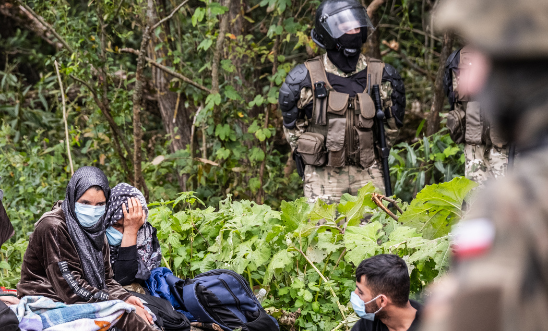
Press releases
Poland: Digital evidence indicates Afghan asylum seekers illegally pushed back into Belarus

Amnesty’s Evidence Lab analysed and verified satellite imagery, videos and photographs of incidents at the border
Digital evidence can be found here which exposes the suspected illegal pushback and inhumane conditions of the camp
‘The dire situation facing the Afghans on the border is one that the Polish government has created’ - Eve Geddie
A digital investigation by Amnesty International has exposed previously unknown details about the dire situation of 32 Afghan asylum-seekers, including four women, 27 men and one 15-year-old girl trapped on the border between Poland and Belarus without food, clean water, shelter and medicine.
Amnesty’s Evidence Lab used satellite imagery and photographs to measure the area and 3D reconstruction, and it irrefutably shows that in late August the group of Afghans on the border were shifted from Poland to Belarus which appears to be an illegal pushback by Poland.
Amnesty’s investigation shows that on 18 August, many of the 32 people who had entered Poland from Belarus were on the Polish side of the border surrounded by Polish border forces. However, one day later they were back on the Belarusian side of the border. This movement could constitute an unlawful pushback because it appears that the movement occurred as armed Polish border guards surrounded the refugees’ makeshift camp.
On 20 August, all 32 Afghans stuck on the border made applications for international protection in Poland, with the help of lawyers, showing that they wished to remain in Poland.
On 25 August, the European Court of Human Rights (ECHR) granted interim measures - and subsequently extended them on 27 September - instructing Poland to provide the group with assistance, including access to “adequate food, water, clothing, medical care and, if possible, temporary shelter”. The ECHR also indicate that the group of Afghans claimed they had previously entered Polish territory on 8 August and been pushed back.
Poland has so far failed to comply with the interim measures set by ECHR.
Poland’s declaration of state of emergency
Since the event, the group has remained trapped between Polish and Belarusian borders guards. Poland has restricted movement in the area and on 20 August introduced rules allowing for people intercepted at the border to be returned to the border with Belarus.
On 2 September, Poland declared a “state of emergency” at its borders with Belarus, limiting journalists and NGOs from accessing the area. The “state of emergency” has prevented the oversight of potential human rights violations, raising concerns about the treatment of refugees and migrants in the area, including the unlawful return of other people back across the border to Belarus.
Since 19 September, five people have died in the border area, at least one of which was as a result of hypothermia.
Amnesty’s digital verification
To evaluate the situation on the Poland-Belarus border, Amnesty’s Evidence Lab collected and analysed cross-border satellite imagery, more than 50 videos and photographs of incidents on the border since 12 August.
The images confirm the group’s movements and the increased securitisation of the border in recent weeks. The images came from numerous sources, such as local people and press, and included helicopter footage and satellite imagery – all of which was then analysed and verified.
Using photogrammetry and photo-matching to reconstruct 3D models, Amnesty was able to verify the group’s position on the border, confirm the suspected pushback between 18 and 19 August and the location of the group between 12 August and 13 September. It also exposed the inhumane conditions in the makeshift camp that the group is being forced to live in.
Amnesty is calling on Poland’s government to end pushbacks, to ensure access to the territory for those seeking protection, and to immediately provide refugees held at the border with Belarus with essential humanitarian assistance. Poland should also repeal the state of emergency and laws limiting movement in the border area, and grant unhindered access to journalists, activists, NGOs and lawyers.
Eve Geddie, Amnesty International’s Director of the European Institutions Office, said:
“Poland has been cruelly holding this group of people on their border in horrendous conditions for weeks.
“Our analysis shows irrefutably that the group's position shifted from Poland to Belarus overnight, which strongly suggests that they were victims of an unlawful pushback.
“The dire situation facing the Afghans on the border is one that the Polish government has created. The declaration of ‘the state of emergency’ is illegitimate and must be lifted. The situation at the country’s borders does not constitute a public emergency by European and international definitions.
“Forcing back people who are trying to claim asylum without an individual assessment of their protection needs is contrary to international and EU law. The introduction of new laws and measures that attempt to legalise pushbacks do nothing to change that.”